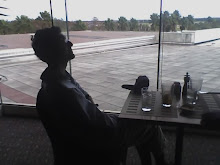On the last day of 2008, my friend and I visited the Museum of Fine Arts in Boston to see images of a time and place far removed from ours. We saw works of art from the Assyrian Empire, whose rulers governed much of the Middle East 600 years before the birth of Christ.
As my friend pointed out, much of the art frankly depicted the Assyrians' wars: soldiers beheading enemies, hauling their bodies onto poles, and taking their families into captivity. Even the physical appearance of the enemy was not spared: one hapless monarch was repeatedly portrayed with a receding hairline.
With the US now approaching Year Six of the Iraq War, and Israel launching attacks on Gaza for a little less than two weeks, I'm thinking about the way the Assyrians portrayed war then, and the way that the media portrays it today. The Assyrians boasted about the atrocities they committed, creating intricate wall-size panels out of stone. Over two thousand years later, however, the American and Israeli governments and media organizations are more cautious. The Bush Administration, for instance, has prevented news organizations from photographing the coffins of US soldiers killed in combat, while the Israeli government has restricted media coverage of the Gaza Strip since the conflict began.
Where the Assyrians were frank, the nations of today do not want the general public to see what war brings. Perhaps the Bush Administration remembers the outcry after photos of prisoner abuse at Abu Ghraib became public. Then again, it is possible to manipulate war photos to create false images, which happened to the Israeli government during its war against Hezbollah in 2006. Both reasons could explain the reluctance of the US and Israel to allow the media to do what the Assyrian artists once did: Show what happened. And perhaps this reflects a change in the way people and governments across the globe see war -- not as an image to display triumphantly, but as something to conceal. I don't think that's progress. What would be progress is if we saw war as something to confront and discuss honestly.
Thursday, January 8, 2009
Images of Iraq and Israel
Labels:
art,
Assyria,
Bush Administration,
culture,
Iraq,
Israel,
museum of fine arts,
news,
war
Subscribe to:
Post Comments (Atom)




No comments:
Post a Comment